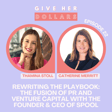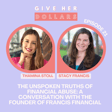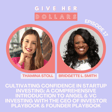
Mastering Money Together: Financial Strategies for Couples & Parenthood with the Founder of Her Personal Finance
Update: I recently launched my newsletter, The Sheconomist, and would love for you to subscribe: sheconomist.com - I share so many tools and resources that help young, high-achieving women with radical money and career self-advocacy.
----
Eryn Schultz is the brilliant mind behind Her Personal Finance. After graduating from Harvard Business School, Eryn embarked on a mission to bridge the gap between corporate financial literacy and personal finance management.
In our conversation, we talk about navigating student loans, investing with confidence, and redefining financial strategies for couples. By dissecting the nuances of combined finances, Eryn offers practical advice for couples seeking financial harmony while preserving individual autonomy.
Listeners gain exclusive access to Eryn's perspective on hiring financial advisors and understanding the impact of fees on investment portfolios. With a focus on transparency and fiduciary responsibility, Eryn demystifies complex financial jargon, empowering individuals to make informed choices aligned with their long-term goals.
This episode concludes with a deep dive into financial preparedness for parenthood, as Eryn shares personal anecdotes and essential tips for navigating the financial implications of starting a family.



















